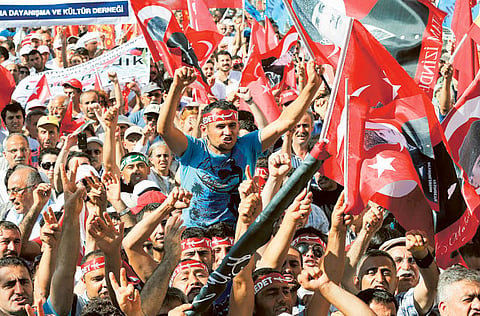EU ministers clash over reviving Turkey talks
Some countries want to delay discussions after protests

Luxembourg: European Union ministers clashed over whether to revive membership talks with Turkey on Monday with several countries joining Germany in arguing it would send the wrong signal to reward Ankara after a crackdown on protests.
The objections of Germany, Austria, the Netherlands and others make it likely that the EU will cancel or postpone talks scheduled for Wednesday, raising new doubts about whether it will ever be admitted to the European club.
The EU had planned to breathe new life into Turkey’s EU ambitions on Wednesday by opening a new chapter, or policy area, in its EU membership talks — the first opened since 2010.
But Germany is blocking the plan over Turkey’s handling of anti-government protests that swept cities after police used tear gas and water cannon to disperse a demonstration against the redevelopment of Taksim Square in Istanbul. Two weeks of clashes with police have left four people dead and some 7,500 injured.
Austrian Foreign Minister Michael Spindelegger signalled strong support for Germany’s stance when he arrived for an EU foreign ministers’ meeting in Luxembourg on Monday.
“We are waiting for signals from Ankara that they are really going to give people in Turkey their rights,” he said. “They have to think about the behaviour of their police... There has to be some movement from Turkey before we start negotiations on a new chapter.”
German Foreign Minister Guido Westerwelle and Turkish counterpart Ahmet Davutoglu discussed the issue in Qatar at the weekend and held more talks by phone on Monday.
“We are in constant touch,” a Turkish official said. “Our position is very clear and we are making our views very clear to everyone.”
Westerwelle also said Germany was in negotiations with Turkey and in talks with its European partners. “On the one side we cannot ignore what happened in the last few weeks,” he said. “On the other side we have to be aware of our responsibility in our long-term relationship with Turkey.”
Turkey and Germany became embroiled in a diplomatic row last week after Chancellor Angela Merkel said she was appalled by Turkey’s crackdown on protesters.
EU ambassadors discussed the Turkish issue briefly on Monday morning but reached no conclusions and ministers were also making soundings on the sidelines of the foreign ministers’ meeting, EU sources said.
A spokeswoman for Ireland, current holder of the EU presidency, said no further discussions on Turkey were scheduled but Wednesday’s round with Turkey had not been cancelled.
A senior Turkish official told Reuters last week that a decision by the EU not to open the new chapter would “draw a strong reaction from Turkey”.
Turkey’s Hurriyet newspaper quoted a senior Turkish diplomat last Thursday as saying that Ankara could suspend negotiations with Brussels altogether if the new chapter was not opened this week.
Germany’s hardline stance is causing alarm among some European policymakers who think the correct response of the EU to the Turkish protests should be to engage more with Turkey to support civil rights rather than moving away.
Swedish Foreign Minister Carl Bildt, a supporter of Turkish EU membership, said the bloc had a long-term strategic approach to enlargement that was not subject to “short-term whims”.
“There are always things happening in different countries,” he said. “We can’t change the strategy of the European Union just because there happens to be nervousness in one quarter or the other.”
Analysts see electoral considerations as playing a role in Germany’s position. Merkel’s conservatives oppose Turkish EU membership in their manifesto for September parliamentary selection. Delaying talks could help them politically.
Fadi Hakura, a Turkey expert at London’s Chatham House think tank, said the Turkish government was in a “very prickly and combative mood” and was likely to respond to an EU snub on the talks by suspending political contacts and meetings with EU institutions and possibly recalling its ambassador.
Turkey opened negotiations to join the EU in 2005, 18 years after applying. The talks have advanced at a snail’s pace. It has provisionally closed just one of 35 chapters or policy areas. It has opened a dozen more chapters but most of the rest are blocked due to disputes over the divided island of Cyprus or hostility from some EU members.


